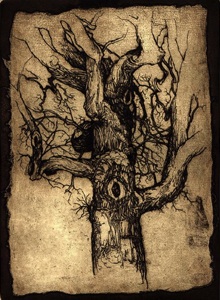|

|
| "Old Bur Oak" by Ladislav Hanka |
Gayle Kaune
Three Girls and a Pony
stand outside Angkor Wat.
The pony is dressed with a gold halter,
red saddle, blue strap behind his
ears.
The girls, about twelve, have turned
their backs to the pony for a moment
and are huddled together
laughing,
talking of boys.
Tourists walk by. Nobody
puts a child on the pony
for a photo because it is winter
in faraway
places; all the children
are home and in school,
though not these girls,
here, in Cambodia.
Reflected in a wide pool is the temple –
once a place of prayer, homage
to the gods. Now, a mecca
for
tourists from Korea, Japan,
the U.S. The pony knows nothing
of this; he worships the three girls,
their hands
offering sweet treats,
their clear voices
always singing his praise.
There is this Thing About Blood,
blood that doesn't stop until we are drained,
anemic, transfixed, like some pale saint
in Raphael’s paintings
but it’s not art,
it’s my daughter and my other daughter
and myself, the years of menstrual clots
big
as golf balls. It’s one bruise
after another and how was I to know
it’s passed on? And here we are, the
bloody
noses of childhood and all the surgical
weeping. It’s blood and we’ve all got a thing
about
it and last week when the hematologist
tells us it’s so rare he’s never seen three
generations of it passed
down, transformed,
I want to snatch my newborn grandson
away from his needle, tell him, That’s enough!
And
when my daughter speaks of her hard, long
labor; no epidural because of possible
paralysis, I want to tell her to
stop talking,
but I’ve got to listen, I’m the one who’s
passed it on, Storage Pool Disease,
but
it’s okay I tell myself,
as I see the photo of the dark, red placenta
coiled on a steel tray, a spongy mass,
something primitive people might eat,
something to remind me this is not
about loss, but life.
Gayle Kaune has been published widely in literary magazines including Whitefish Review, Poet and Critic, Embers,
Kalliope, Willow Springs, Crab Creek Review, Seattle Review, Windless Orchards, Milkweed Editions, Calapooya Collage, South
Florida Poetry Review, Centennial Review, Bellowing Ark, Convolvulus, and Portland Magazine. Her chapbook, Concentric Circles,
won the Flume Press Award. She has won several Washington Poet Awards, a Ben Hur Lampmann Award, and has been nominated for
a Pushcart Prize. Her full length book, Still Life in the Physical World, was published by Blue Begonia press. She lives in
Port Townsend with her husband and a big white dog.
return to top of page
Michael Frissore
Faster Puggycat! Bawk! Bawk!
Devious as joy, Alex grabs the
furry red chicken puppet
and chases the cat around shouting,
"Puggy! Bawk! Bawk!"
until he catches up,
splashing on top of the feline
like King Kong Bundy,
and Basil meows and slithers,
trying to escape his innocent clutches
until I peel Alex off like a Band-Aid
and stand him up,
but he still says,
"Puggy! Bawk! Bawk!"
trying to work the fowl,
an infant Edgar Bergen
chasing and laughing as if
in a cartoon,
and Basil's the sport,
never clawing,
never biting,
just taking it,
taking it in exchange
for Mommy
and Daddy’s affection,
which always goes to
the child anyway.
Later, the cat tears
his own fur out again,
leaving piles everywhere,
while we read Alex
Bark, George,
and Basil thinks maybe,
maybe when he's asleep
the attention will come.
Michael Frissore's poetry chapbook Poetry is Dead won the Coatlism Book Prize in 2008, and his poems
are forthcoming in Boston Literary Magazine and High Coup. He grew up in Massachusetts and lives in Oro Valley, Arizona
with his wife and son.
return to top of page
Aaron Deutsch
Everyone Gets What He Deserves
Out where the horned rattlesnakes
uncoil,
night
is the croak of rust-colored toads.
Behind a thin
slice of mesh fence
separating park trails
from back country,
where bucks die
in phantom corners
as
coyotes drag them
acre after jagged acre,
someone has piled human bones
here.
That's when I knew
there
were people who'd leave
shovels
behind the wheels of my car
in this life:
The sign above the horse
trail
blotted by spray paint
"SMEAR THE QUEERS"
was a sign of my tribe.
A light breaking through a
night
of hoot owls
could be someone's cell phone
thrown
and glinting
like a fading searchlight
as if to say
"this is what you get for going home
with strangers."
And I'm left to think so many things
go without last rites
as they're dragged
the way firemen
drag their filthy hoses behind them.
No
matter how tight I shut myself up,
windows locked in the crisp fall
of crow calls and frozen earth,
there
is blood and a smoldering stick,
corpses with joints akimbo
still.
When some boy dies
under the ghost-rays
of hospital light
or in the windy grim
of big sky country
is he ever told
he got what he deserved?
No matter where you are,
under the gray-matter sky of Ghettos
or looking up at ball-pin stars
through
rivulets of blood
The sight of killdeer crashing
against old stone
hidden by viscous overgrowth
is
only as frightening
as your last breath,
when you know it's coming.
Fortune-Cookie Triptych
-For Jennifer Maier
*
The
Passion of a Cut Sleeve
I. The joyfulness of a man prolongeth his days.
In the old China, where consorts sung like nightingales,
where
men couldn’t love men and the cool
wind of their home at once, Emperor Ai of Han,
who wielded the force of a
swiftly swung Long Dao blade,
dreamed only of his supreme general, Dong Xian.
These men of war and death, of trial
by fire
and smoldering ash, napped one day in each other’s arms.
And the emperor, breath of the last word of
the land,
cut his sleeve upon waking,
to leave his lover undisturbed.
He walked the day out with one bare arm
through fields of green and silver herblings.
š
The Tender Fish
II. Kind words will keep one warm for years,
even
on a King’s fishing boat, out amongst gabled
waves of chill and sea churn, where pillars of pyrite
light wash
over water. Where Lord Long Yang caught
a tender fish, and loved its scales of lapis and pearl.
Yet, as he looked
to his King swathed in red regalia,
watched his jaw cut into the scoured ocean air,
he could not help but cry. “When
I caught the fish,
I was extremely pleased. But now I seek a new fish,
as I fear all men do.” And the King of
Wei, as much
silk as stone, soft as he was royal, had this to say:
"I am a previously caught fish, too."
š
The
Shared Peach
III. Love always and deeply,
like Duke Ling, who knew the world and its spiders
of anger but
nothing else, and found in a grove voluminous,
among beguiling violets and nebulous peaches, a young man
glad to share
a bite of his ripe fruit.
The passion and sting
anxiety
of flavor
wild juices.
And though the young man was fair, coal black hair and
eyes
bright as fire opals, Duke Ling did not love him for what he was,
but for what he gladly gave, as if to say,
the world is only bitter
as hoarded fruit rotten and forgotten.
Aaron Deutsch is a recdent
graduate of Texas State University-San Marcos, where he received his MFA with distinction. He has served as a poetry editor
for Crab Orchard Review and Front Porch Online Literary Journal. His work has appeared in Grassroots, and is forthcoming in
The 9 Online. He has no pets.
return to top of page
Răzvan Țupa
extended play
at first you can’t believe
that a man changes his face
every two minutes
and you see only whatever you brought from home
your breathing gradually usurps every body
then it usurps everything that defines your coordinates
there in front of your yellow cup of coffee
for just a few moments our thoughts
hung in the air balanced on the tenuous melody of breath
that’s all
translated from Romanian by Adam J. Sorkin and the poet
totem 6
in the middle of the street you’re as if between
the first and second stanzas of a melody
duran duran you say what you can excuse me may I help you with something?
maybe you like art and you saw
the gigantic photograms imprinted
on the store windows
how they transform all the discomfort of being a man in this city
do you hear me? a man not a tourist
you’d have admired the packed cafés
the boulevards full of warm dirt
the fluid exhalation of the WC’s
but now you’re beyond wonder now all of this is you
translated from Romanian by Adam J. Sorkin and the poet
Răzvan Țupa (born 1975) is the author of three books: Fetish (2001, which won the Mihai
Eminescu First Poetry Book Award), Fetish - a Romanian Book of Pleasure (2003), and Romanian Bodies (2005). Țupa was
included in the U.K. anthology, No Longer Poetry: New Romanian Poetry (2007). He has also recorded video poetry, served as
editor of the film section for Time Out magazine, produced a one-hour feature film on young poets, “Poetry. The Power,”
and was founding editor of Versus/Versum poetry journal.
Adam J. Sorkin recently published Memory Glyphs: Three Prose Poets from Romania (Twisted Spoon Press, 2009), Mircea Ivănescu’s
lines poems poetry (University of Plymouth Press, UK, translated with Lidia Vianu), and Rock and Dew, poems by Carmen Firan
(The Sheep Meadow Press, 2010, translated mostly with the poet). Ioan Es. Pop’s No Way Out of Hadesburg will be published
by University of Plymouth Press this fall.
return to top of page
|

